The Tourist
1
The tourist gets off the plane, breathes in the warm, humid air and prepares to discover the land that the travel agency promises is paradisiacal. Full of lush vegetation, welcoming people, ready with a smile, warm and semi-deserted beaches, creative gastronomy, and an inner peace guaranteed to be achieved on days uncharacterized by work.
The tourist carries a bag full of sweets in his suitcase to give to the poor who will shout “sweet, sweet” as he passes by. He doesn’t notice the fact that, ten minutes later, neither one nor the other will remember the faces that exchanged treats.
— Welcome to the land of the leve-leve (slowly-slow)! – Nelson repeats for the thousandth time, with porcelain roses and parrot beaks in his almost teenage hands. The welcome greeting encouraged tourists to become excited about the land where they landed. Soon another boy offers his services:
— I’m Jéjé, proven tourist guide, with special hands for making necklaces and everything else you might need.
The tourist still smiles, but not the boy who is shooed away while the suitcases are heavily thrown onto the transfer that takes him, along with the other tourists, directly to Ilhéu das Rolas. On the way, he enjoys brief sensory delights: the luxuriant vegetation, bodies meandering along the roads with breadfruit, cassava, bananas or huge fish with names unknown to you, women in colorful cloths, beams of light in the thick leaves, little houses on stilts in lost and enchanted villages, the green landscape thickens as he approaches the south. He shivers slightly at the machetes he sees on the road, a fundamental work tool for islanders, remembering images from a DVD about Hutu and Tutsi revolts, and he didn’t know what other people were so savage.
Once at the Ponta Baleia pier, the new group continues on the semi-rigid boat towards the islet. As the boat moves away, unaware of the wonders and mysteries hidden there, Jalé beach and Piscina beach are, for the tourist, just diffuse contours between the forest and the sea. In these diffuse points that he will never get to know, Waldemar escaped him, machete in hand late into the night, on his way to the forest to tear down the ocá and build a canoe. It takes 4 days to shape the tree and drag it, once navigable, to the beach. We learned about Josué’s commitment to going out to sea to fish for grouper, garfish, and shark, to be sold for pennies in the square. The countless kilometers walked by Aissata, carrying bananas and breadfruit, escaped him. Perhaps the tourist’s cell phone will take many selfies with Pico Cão in the background but will ignore the destruction of the forest for palm oil exploitation. Or don’t mind that the islet of Rolas, where he will be staying, was bought by a hotel group that expelled its inhabitants, keeping the keys to the lighthouse.
A glimpse of the coast makes the tourist feel a bit unwell and dizzy. Was it the speed of arrival, having crossed part of the island without having captured anything? Nor photographs that give veracity to his memory? But he soon returns to the vacant place that fulfills his lifelong desire: to be able to tell himself and others that he was in Africa, an immense, sweet, and violent land, of amazing stories, prodigious adventures, and invisible worlds. A land so generous that it offers everything. Even before adapting to those colors or exchanging words with your traveling companions, he doesn’t shy away from photographing everything he sees. The unpredictable could happen at any moment, after all he was in Africa, where suspicious things happen, it was necessary to document them. Pointing the camera at the boatman’s muscular arms, as if they were objects, he is surprised by the sudden respect that the figure inspires in him. His excitement is slowly being threatened. Maybe he won’t truly access that island, maybe everything he carries will be of no use to him.
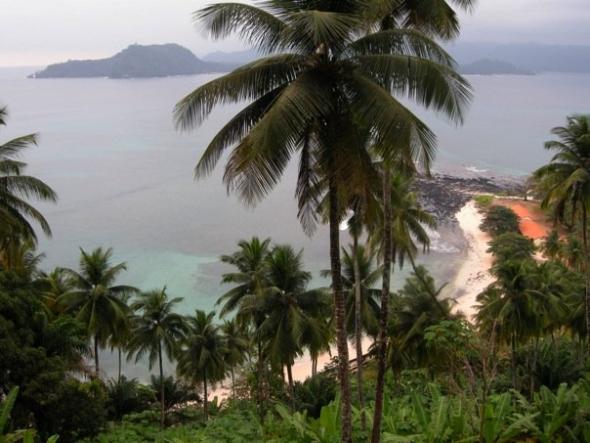
2.
Adds to his European fatigue, the plane journey, and the long queue to get your passport stamped. He deserves rest, that rest that follows two years of work, home, shopping center, visits to the in-laws, children’s school, lunch with a friendly couple, DIY projects, anguish over bills and debts. And, above all, the boredom of a marriage without lust. Sex, every three months, while keeping an eye on the clock.
Identifying the small saturations that have been moving him away from who he thought he could have been helps him free himself from his domesticated animal skin.
Relaxing on a lounger by the pool at the resort, the tourist feels the pleasant impression that, for a moment, the earth stops spinning. The appeal of Ecuador, its location neither north nor south, the hemispheric hybridity and the mild wind, provide an indomitable desire to lose oneself in sensuality on tropical islands. An atmosphere suitable for laziness, “comfortable even in Gravana,” warned the travel agency’s brochure.
Thus, suspending the romanticized memory of the cocoa fields of Sousa Tavares, he falls asleep with the book on his lap, in that vacation atmosphere. Vacations, full stop.
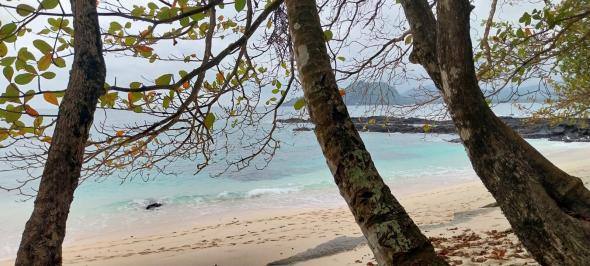
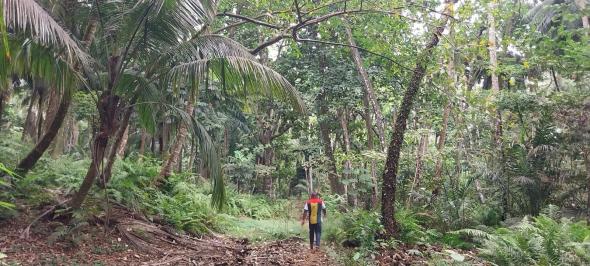
3
In the city, at the bar table where the sea waves merge with kizomba and tarraxinha from the columns, two Angolans and three Portuguese speak assertively about the country’s destiny.
— That will be the next mayor.
— The so-and-so will receive a commission to host a resort.
— The minister should close his eyes to a few more hectares of felled forest.
One of the Angolans is optimistic. He believes that the country needs vigorous, operative men, and sets objectives in accordance with his well-laid plan. His presence is disturbing: instead of talking, he speaks, and it is a challenging task to interrupt him to “say a little something.” As if everything were confidential and highly exciting, he speaks with the same conspiratorial spirit of someone who is creating works or overthrowing regimes, casually dealing with the powerful, designing the political strategy and progress of the nation, two countries that are flesh of the same flesh, blood of the same blood, crossed by colonialism and now fraternal in reconstruction, united in the glory of the future. And he celebrates with champagne, infecting the others.
— To self-esteem and the promise of money, to the slowly-slow, to the lady of Muxima, cheers!
The journalist, involuntarily placed at that business table, listens to the conversation with his head down. Every time an “ouch” is about to come out of his mouth, he is entitled to a discreet kick under the table from the Portuguese woman who brought him. All he can do is take another sip of whiskey to avoid asking obtuse questions. The arrogance of those men, much like kings of Persia in the chess game of other people’s lives, flows directly into the whiskey that they furiously chug, in conspiratorial muteness.
Fragile land where the fresh smell of the dollar is felt on the skin… thinks the journalist. It could be the starting line for his story. Actually, the trip to São Tomé was intended to produce a report on cultural issues, specifically a major event. He was tasked with reporting on the island, expanding that tiny dot on the map, expanding the family of the poor relative of Lusophony, from a slave warehouse to a cultural warehouse. His friend, working in São Tomé as a consultant for an oil company, has relationships with high-ranking authorities and has the ability to curb opinionated feelings so as not to harm the business. He invited him for a drink and “meet the crowd,” that is, a certain elite. Suddenly, the journalist found himself in that cauldron, abundantly aware of the coordinates under conjecture.
Everywhere, private interests are the driving force of public life, the journalist knows this. Politics is not his area, and it never gets more than a monumental yawn from him. But seeing the underground happenings of the political game up close has some impact. He tries not to forget that the delirium of the elites has no relationship with the parallel world of the children of the land and their lives directly dependent of the resources. People going through times and regimes, stuffing their faces with palm wine, laughing in disbelief at politicians, despite voting for them, so that on election day they can celebrate historical anguish or the illusion of change with aguardente.
In his profession, familiar with the categories of compassion “black,” “hungry” or “immigrant,” there is no room for great surprises. However, the journalist now returns to the hotel shaken, embarrassed by the incommunicable realities that populate and collide in the same world. His inner restlessness and trace of naivety may have dissipated forever. As he feels shocked, he retains expensive words that morally position his story, such as impunity and corruption, democracy, and neocolonialism.
That country, a laboratory of human and landscape experiments, begins get his interest.
4
Meanwhile, at the resort, the tourist gets bored with the life of being comfortably laying down, among flabby women taking selfies, strutting families, monotonous food, and swimming pools all the time. The entertainment area only offers the disinterest of bored couples, or a group of bank colleagues getting loudly drunk. The islet has little of the Africa he had dreamed of (except for the impressive landscape, but that resembled some corner of Brazil). The local inhabitants, all expelled for pocket change to build little houses and free up the islet for tourists. A few young people from São Tomé who come and go in little rubber boats to sell handicrafts to tourists and fish to the restaurants. If he manages to extract information about the lives of the “locals,” as he was told, it is perfectly conditioned by the commercial relationship that mediated them.
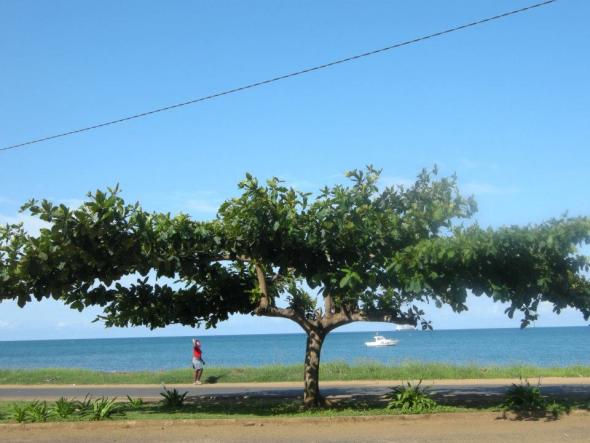
He then decides to partially disobey the tourist package. He asks to travel around the main island for two days in a rented car, as he is curious about the tour of the colonial farms. They give him a young guide, knowledgeable about the country’s history, and there they go, in a rented car. He was already aware that the physical memory of the former colonial empire was heading towards vertiginous deterioration, but when he visited the Agua Izé and Agostinho Neto farms, he was twice as impressed. First with the grandeur of those architectural structures that leave one guessing what that might have been. Then by its devastating state and by the guardians of the buildings: children, persistent farmers, freedmen descendants or representatives of those who were dragged along the difficult path of the contractor. Lack of paid work, habituation on the edge of the knife, unraveling reigns, never stepping back. You can always count on a few crops and rich fruit trees.
The tourist is moved by the decay of the rural ruins and by human “resilience.” Words in his head, not mine. Once again, he feels like photographing everything around him, living, for a moment, in the belief that he is the only man to have access to a well-kept secret of history. As quickly as he starts taking photographs, he asks random questions about the fields. His haste reveals more interest in the questions than in the companion’s answers.
The guide Mariano tried to explain some curiosities about the forros, the Angolars who refuse to work on the plantations, the contractors from the other colonies, the revolts, the Trindade War, or the Batepá Massacre, it depends on who tells it. Mariano points out the convulsions and joys of independence, how the economic architecture of colonialism was succeeded by the inefficient exploitation of land. The Cape Verdeans who lost their farms, the nationalization of farms, the division of land, the drop in production and the serious economical crisis situation, the turnaround of the socialist regime, multipartyism, the liberalization of the World Bank, international aid and even the failed expectations of tourism.
The tourist is impressed by the guide’s wisdom, and still tries to glimpse all these political and cultural scenes from the past, but his vision is rather limited to the peeling paint on the wall, the wooden balconies with clothes drying, the thick and firm legs of women, to the “white, white” appeal of children with each new face.
He writes in his notebook: Administrator’s house, hospital, big house, the sanzala as far as the eye can see. And these people going around, they live here in this weather, dancing and making grog, harvesting cocoa, oblivious to the world. Flocks of children constantly reach out their hands, asking for sweets or notebooks and I no longer have any sweets. He would properly label his digital album, with enlightening comments like the organized traveler he was.
After a few minutes, the tourist’s hunger wins over the curiosity. He has already seen and known more than enough about that “disgrace;” he doesn’t need to visit the other farms. He wants to get away from the misery, immediately return to his vacation at the resort: freshen up, have a few drinks, and think about life, but a full life, with contemplation, pleasure, and everything that a citizen like him was entitled to. If it’s not for everyone, that’s too bad, he thinks.
5
At the hotel, the journalist tries to access WiFi to research data about the country that fits into the report on cultural events. One episode from History particularly catches his attention:
During the 16th century, São Tomé became a large sugar producer that increasingly needed slave labor. With the increase in the slave population, the number of slaves who fled to the inaccessible dense forest in the mountainous interior of the island also increased. Initially, self-freed slaves in the interior of São Tomé were known as macambos. Since the 19th century, their descendants have been known as Angolars, who still constitute a culturally and linguistically distinct group in São Tomé.
In 1595, São Tomé was shaken by a slave revolt, led by Amador, who mobilized around 5,000 slaves against the governor’s troops. After three weeks the revolt ended with the defeat of the rebels.
Thoughtful for a moment, he shifts his gaze from the screen to the black blanket of the sea in front of the 4-star hotel. He is just another journalist with aspirations to become a writer and, instead of reporting, he wants to write a story instead. He began to imagine that all the oppressed people on the plantations, from sugar cane to coffee, and later cocoa, the oppressed people of all times, whether sent or born on the islands, had hidden themselves inside the forest, over the Caminho do Fugido. There they had created a community with its own rules of kinship, economic organization, language, war, and honor. As in palenques and quilombos, escaped slaves arrived, chased by wild animals and former masters, and slaves were freed by quilombola groups who went to the fields to rescue them. After all, it was violence that had given rise to such cultural encounters.
I want to see… where the men are… The song by Jorge Ben Jorge, Zumbi, came to mind, the gentlemen sitting watching the harvest of white cotton being harvested by black hands, slaves gathered in Congo, Benguela, Monjolo, Cabinda, Minas, Quiloa, Rebolo to Brazil. However, in the journalist’s story, Zumbi de Palmares, lord of wars and demands, made an appearance in São Tomé where he created an alliance with King Amador and, with his people, marked the warrior camp in the forest as the perfect place for the spirits conspire in revolt, renewed, combative. To silence the boy who repeats “sweet, sweet” to every white person that passes, and demand a future without depending on the funds that will come. And in every charm with the slowly slow of people, the wind makes its silliness felt. In each compliment to kindness and the slowly slow rhythm, they shout against the precariousness of lives, bewitching sleepwalkers with the perfume of Micócó.
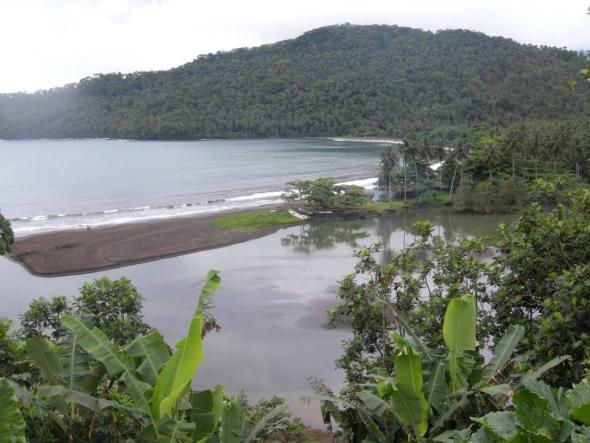
The journalist travels to high zones of the imagination, bringing together protagonists of revolts against shackles, exploitation of labor, and forced evangelization. It mixes images from Django Unchained with António Conselheiro, he is excited by the freedom of writing and his utopian but dystopian tale, the strength of a secret resistance in the primary forest surrounded by lianas, ferns and mosses that barely allow a glimpse of the pines and Afrocarpus where no one dares to go, except for a few sporadic healers who don’t even notice those beings, specters of slave ancestors, destabilizing promises looking at reality so far from being free. And with the ethics of not interfering in sacred matters except for their profession, the healers would also not inform the rulers of the country about such a community.
Few knew, therefore, of the existence of these men and women, macambos, Angolars, warriors of remote African origins, who had been developing the seeds of their revenge there for generations and generations. Without ignoring the current development of the world, they had communication devices and from time to time sent infiltrators into the city to monitor what was going on. But the material that united them, the powerful ancestral anger, was not compatible with the mediocre existence of public servants, market sellers or even rulers. They preferred to stay away from these people who killed themselves working to feed their number one enemy: exploitation. They absorbed the purifying and rhizomatic botanical virtues of the forest, the wisdom of time, the sharpness of sound and the light fought for by all living beings. It was an ongoing process of empowerment until the day of revenge for the united rebels arrived.
Suspending the narration, the journalist drinks another whiskey from the minibar and leaves the story unfinished. It would be useful to go to Parque Obô, as a colleague suggested, to give concreteness to your literary hunches. But the organization of the event in which he was involved, interested more in networking than in rural heritage, had scheduled a trip to Ilhéu das Rolas for the following day. He looked at the program. There was a lunch with the patronage gentlemen. He printed the text he had to add details. He goes downstairs and meets his friend at the reception. He wants to tell her a little about the insurgent community that he had just written about, but she comes excitedly announcing that the businessmen with whom they had spoken the day before were fleeing by plane in a hurry without explanation. There were rumors of some kind of coup d’état, or something scary.
“Fear is everywhere,” said the journalist. “Fear isn’t going to have everything,” the friend spiritually responds. They let the question of the answer sink in, they walk along the São Tomé waterfront, along the bay of Ana Chaves where the foam of the small waves becomes flourishing in the dense darkness. They knew each other from Lisbon, from their college days, but that situation embarrasses him, his relationship with wealthy and influential people. The friend has difficulty transmitting her humble assessments about local matters when a Portuguese person has just arrived. It was all too superficial in the assessments and value judgments of those who hadn’t been on the island long enough to understand certain subtleties. So, she shields herself from big thoughts, she prefers to agree or add information to those banalities of the tourist vision, which alternates between an idyllic or a disapproving tone.
6
Back in the pool with his book, the tourist notices that there are more people reading Ecuador also in front of the pool. He gets frustrated with this because he likes to be different from others. He still feels like he is recovering from poverty and the smiles of children in the farms. Deviled, wanting to make him feel guilty about the beer and caipirinha he ordered. And they still proudly offer him a cocoa, the poor things, look at the beautiful wealth that generates so much conflict.
He believes he has already accumulated hundreds of photos of children, big smiles, innocent eyes, bare bellies, broken charity t-shirts, toys they built themselves. He would show the photographs like a trophy to his friends. Without being able to formulate it that way, he felt the potential of poverty and how these moving records always work. Children are the easiest face for that worn-out name, poverty.
However, he feels slightly disappointed with his vacation. He thinks about taking a walk around the islet.
“Besides the Equator and the beaches, what is there to do here?,” he asks at the reception.
“You can go diving.”
“Hmmmm… And there’s no highlight for taking photographs?”
“The island’s greatest attraction, the Equator, is high. There is also a lighthouse up there, but it is not accessible to tourists.”
After a reluctant “thank you,” the tourist set off. As he walked, he stepped on the ripe leaves on the hillside towards the lighthouse, thinking that he was a different tourist and went to places where tourists don’t set foot, and that he should read books that other tourists didn’t read. What the hell of an idea to read Sousa Tavares’ Ecuador in São Tomé… These small disobediences correspond to his great adrenaline. He follows a steep zigzag, distracted by the thought that the mountain boots that had just been released were really of quality.
Comes face to face with the lighthouse. A silence soon fills the air.
The tourist is convinced that he was going to enter the lighthouse house and climb the winding stairs to gain the panoramic view that his photographs requested. I felt like I deserved this overview. He stood around the entrance for a few moments. The footsteps of the lighthouse keeper could be heard.
“Good afternoon, would you mind if I just go up for a few minutes to take some photographs?”
The lighthouse keeper, a man of few words like all people from the ends of the world, agreed and opened his house to him. He didn’t like visitors but looked indifferently at the slight tourist, all equipped with machines, hat, and adventure boots.
“Do you live here alone?”
The lighthouse keeper was already expecting this question, accustomed to people’s astonishment at his resistance to solitude. In reality, the tourist felt the need to ask the man something, pretending to be interested while taking his panoramic views.
“Yes, for nineteen years. And I like it,” she promptly says, already anticipating the next question. “I have a radio, I keep informed, my children live in the capital. I have everything I need: peace and quiet.”
The silence in which that person lives disturbs the tourist. It is impossible for him to realize the value of that silence that makes it possible to think about everything there is to think about when there is nothing to think about.
“Brave!” And he goes down the stairs, waves a dry “goodbye” to the lighthouse keeper, deciding to return to the placid waters of the pool.
7
On the way back to the bungalow, the tourist crosses paths with the group who have just landed on a boat chartered just for them. They look like someone who wasn’t necessarily on vacation but someone who uses the reality they observe to: document, create and display. They head to the restaurant where lobster awaits them and conversations about the particularities of Portuguese-speaking countries. They are Santomeans, Portuguese and Angolans, select people without ceasing to be loud.
“It seems that they are more from the cultural tourism sector,” the head of the room confided to him.
The tourist goes to the restaurant’s bathroom and notices some sheets in computer writing inside a folder next to the door. Still take a look to see if it belongs to someone who has just left the bathroom. He’s about to hand them over to the head of the room, but he gets curious and, just in case, puts the pages away. In the background you can see a boy with glasses rummaging through his backpack looking for something. He must be the owner of the sheets, but he won’t ask him. Later, he reads them, on the appetizing bed with sheets changed daily by the friendly housekeepers who earn a tenth of the minimum wage in his country.
That night, perhaps because of the andala fish or because his wife doesn’t answer his calls, he has a strange dream. Some runaway slaves’ shipwreck on the islet, play capoeira, dance bulauê, show scarifications and angry faces. Everything is mixed up in the tourist’s few cultural references. Some of them even wear suits, ties, and expensive brand glasses, they must be businessmen and politicians. They terrorize tourists with anger and satire. In the midst of the riot, one of them calls the resort employee and effusively orders him to fill the pool with champagne. The employee fulfills the demand, without any strangeness. Hundreds of bottles of sparkling wine were thrown into the pool, one by one, and people were thrown there floating on the sparkling bubbles of champagne. The rebels leave the resort and enter the islet, going up to the lighthouse to a shrill cry of victory.
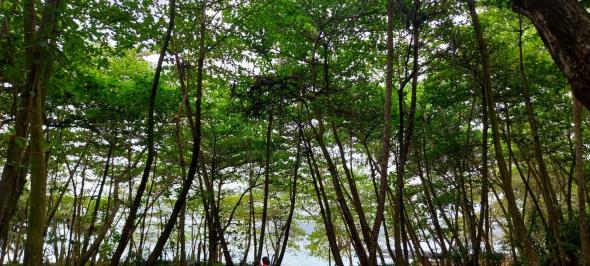
The next day, the tourist wakes up shocked. The agency’s package only allowed one week on Isla Bonita. Returning to the airport leaves nothing notable in the mind of the tourist.
He didn’t notice Waldemar, machete in hand at dawn, on his way to the forest to tear down the ocá and build a canoe. It takes 4 days to shape the tree and drag it, once navigable, to the beach. It is impossible to know how tired Josué was on the high seas fishing for grouper, garfish, and shark, to be sold for pennies in the square. The countless kilometers walked by Aissata, carrying bananas and breadfruit, escaped him. Perhaps the tourist’s cell phone will take many selfies with Pico Cão in the background but will ignore the destruction of the forest for palm oil exploitation. He doesn’t mind that the islet of Rolas, where he will be staying, was bought by a hotel group that expelled its inhabitants, keeping the keys to the lighthouse.
in Roça Língua, Coletânea de Contos, Marta Lança (org), November’s editorial, 2014.